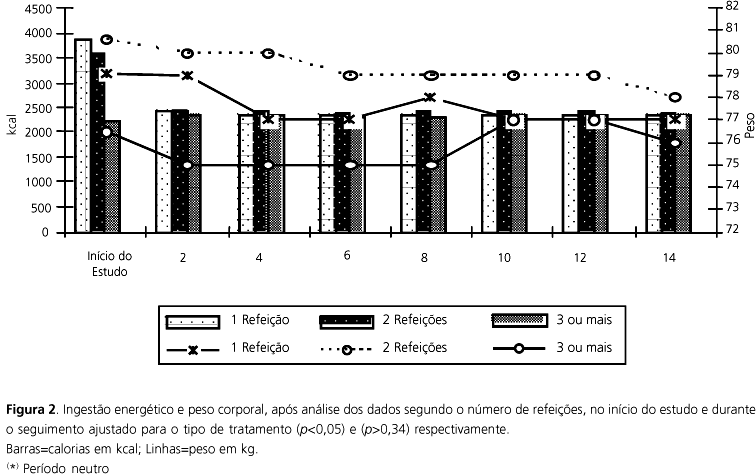OBJECTIVE: Epidemiological studies have shown an inverse relationship between people's habitual eating frequency and blood total cholesterol, leading to the suggestion that, a frequency increase in meal pattern may help to reduce the amount of such lipids. The objective was to examine data collected during a clinical trial, in order to evaluate the effects of increased meal frequency on serum cholesterol of women, who had their usual diet supplemented with either fruits or fiber. METHODS: Forty nine hypercholesterolemic women (BMI>25kg/m²) non-smokers, ages ranging from 30 to 50 years old, and cholesterol level greater than 240 mg/dL, had been tested on their usual diet supplemented with fruits or fiber, during 10 weeks. These women had been randomly assigned to add to their usual diet, either three apples (300g) or three pears (300g), or three oat-cookies (60g), all with similar fiber quantity. At baseline, the meal frequency has been 3.8±1.1; in the follow-up, the meal frequency increased to five meals per day. The registered mean of serum cholesterol was then evaluated, taking into account the change in frequency/number of meals per day, such as one, two, three or more meals. RESULTS: After 14 weeks of follow-up, serum total cholesterol and LDL-C, each showed a reduction of 12.6mg/dL, p<0.04 and 17.42mg/dL, p<0.03, respectively, among participants reporting an increase of three or more meals per day. When the resulting model was adjusted for age, body weight, and type of food (fruit or fiber) added to diet, the values of total cholesterol and LDL-C changed to 11.5mg/dL, p<0.04; 17.3, p<0.04 respectively; however, the difference remained statistically significant for the participants that reported average increase of three or more meals. On the other hand, the HDL-C did not show any change before or after adjusting for age, body weight and type of food added to usual diet. CONCLUSION: The increased number of meals reduced serum cholesterol, independently of age, body weight, and type of added food (fruits or fiber), suggesting that six meals per day may prevent and/or control hipercholesterolemia.
cholesterol; meal frequency; women; diet; epidemiologic studies





